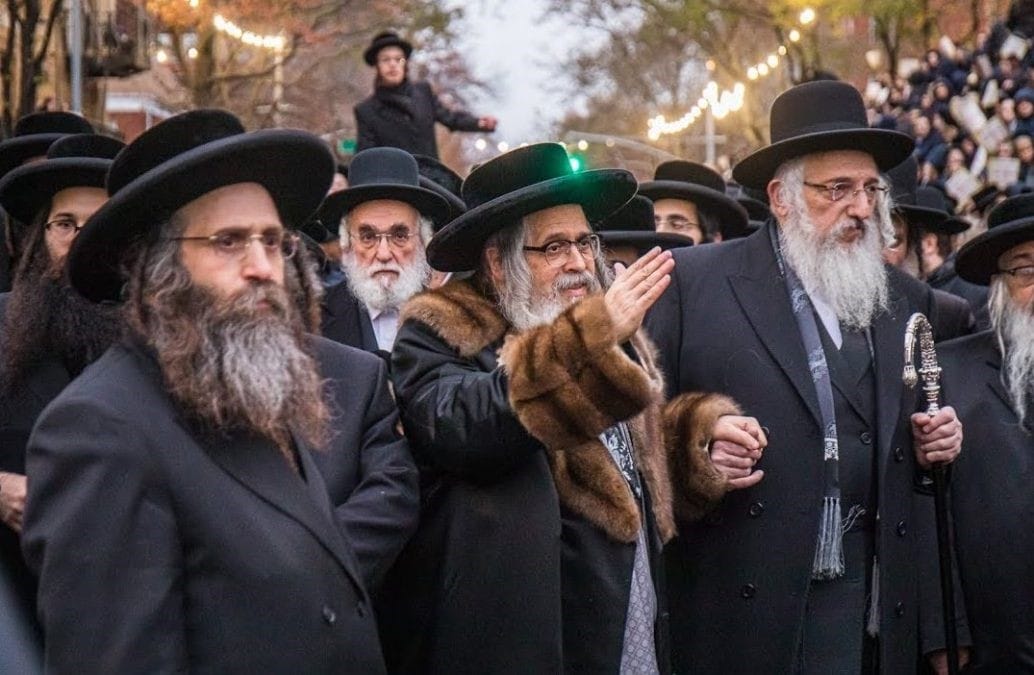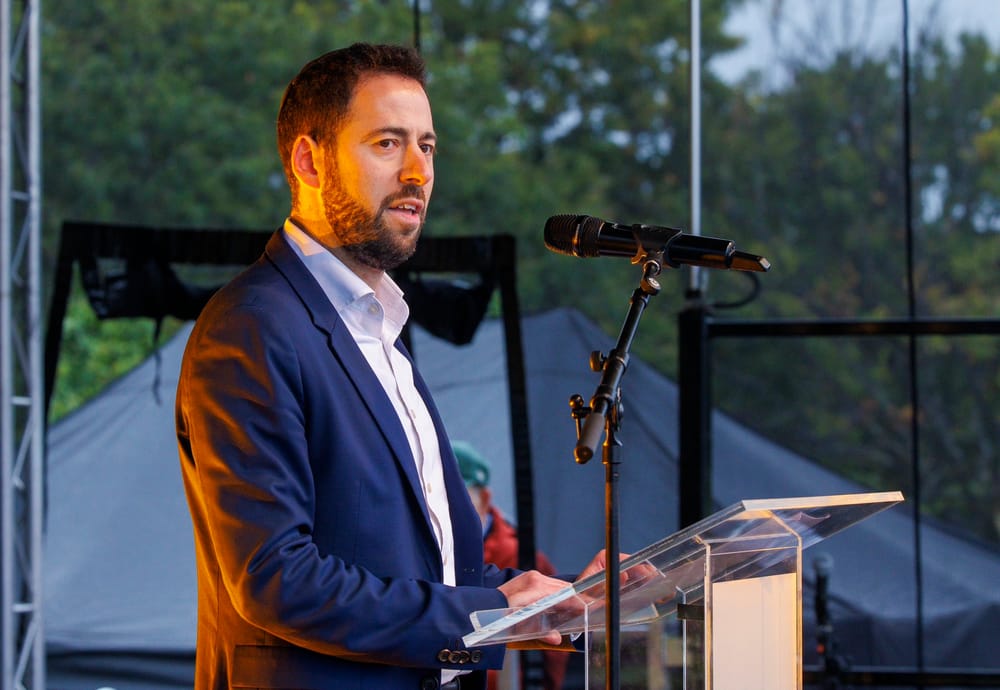What can Hasidic anti-Zionism teach the Jewish left?
As Israel’s brutal war on Gaza rages on, we need approaches to Jewishness that reject this violence while claiming visions of religious purpose and shared life, wherever Jews may be.

Less than two weeks after the horrific Hamas-led 7 October attack on southern Israel and the beginning of Israel’s brutal war on Gaza, the Instagram account Torah Judaism posted a video of one of the two grand rebbes of Satmar Judaism, Rabbi Aaron Teitelbaum, speaking to a crowd of thousands at a gathering in New York. “We have to understand by ourselves and we have to know it: We have no part in Zionism. We have no part in their wars. We have no part with the state of Israel!” He continued: “In the name of the holy crowd gathered here today, we will continue to fight the battle of God against Zionism in all its forms.”
For those who argue that Judaism and Zionism are inseparable, a meeting of ultra-Orthodox Jews gathering to oppose the Jewish state is close to unthinkable. But since the earliest days of Zionism, some of the most prominent Haredi leaders have argued that their religious beliefs clash with the very notion of Jewish nationalism. One of the most significant strands of this thinking was pioneered by the late Rabbi Yoel Teitelbaum, great-uncle of Rabbi Aaron, and founder of the Satmar Hasidic movement.
In recent years, Satmar communities have found themselves in the media spotlight; whether through the series Unorthodox, documentaries like One of Us, or scholarship like American Shtetl by Nomi Stolzenberg and David Myers, there has been renewed attention on the organisation of their communities, the problems with their education systems, and the often devastating costs for people who try to leave. Satmar is known for its separatist approach to Jewish living: its members largely speak Yiddish and have created self-sustaining communities that seek to replicate an idealised version of the European shtetl – chiefly in Williamsburg, Brooklyn and Kiryas Yoel in upstate New York.
But one of the lesser understood aspects of Satmar Judaism is its fierce and unabashed opposition to Jewish nationalism, a legacy that can be traced back to Yoel Teitelbaum’s writings. More than any other figure in the ultra-Orthodox community, Teitelbaum committed himself to a principled and religiously grounded anti-Zionism that was once widespread before the Shoah. What lessons do his writings hold for the contemporary Jewish left?
Teitelbaum’s anti-Zionism
Born in Hungary in 1887, Teitelbaum established a Hasidic court in the city of Satu Mare and quickly amassed a following on account of his religious knowledge and radicalism. Though much of his family was murdered in the Shoah, he survived with the help of the infamous “Kasztner transport”, which arranged for his evacuation out of Bergen-Belsen.
Teitelbaum eventually settled in New York, where he established the Williamsburg rabbinic court as a major destination for Hasidic Jews searching for community in the years following the war. As Hasidic life was reorganising itself after the massive devastation of the Shoah, Teitelbaum brought over what was once an entirely conventional approach to Jewish politics but has now been almost forgotten: ultra-Orthodox anti-Zionism.
This strand of anti-Zionism emerges from a unique perspective opposite most of the contemporary Jewish left. For many, it offers one of the most sophisticated and long-standing critiques of the state of Israel from within an entirely Jewish theological framework.
When Zionism began emerging as a serious political movement in the late 19th century, most Orthodox leaders were quick to denounce it as a threat to religious values, in line with their broader resistance to the reforms of Jewish modernity. Rabbi Chaim Elazar Shapira, or the Munkacs Rebbe, argued that the early Zionist movement had anti-messianic implications in presupposing a return to the Land of Israel before the end times. Meanwhile, the fifth Chabad Rebbe, Rabbi Sholom Dov Ber Schneersohn, similarly argued that secular nationalism would betray the long-awaited hope for a total redemption brought about by God.
But while these figures contended with Zionism in its earliest stages, Teitelbaum was the first major religious thinker to transform these ideas into a fully fledged ideology following the catastrophe of the Shoah and the establishment of the state of Israel. In 1961, Teitelbaum published the VaYoel Moshe, a polemic which decried Zionism as an act of religious heresy, on the grounds that it violates the Three Oaths – an ancient rabbinic concept described in the Babylonian Talmud, outlining the principles of a deeply-rooted Jewish exile theology.
According to the Three Oaths, in order for the Jews to survive in exile, they must not rebel against the nations of the world or enforce a collective return to the land of Israel before the end times; the nations of the world will in turn agree not to inflict excessive suffering upon the Jewish people.
It is crucial that Teitelbaum’s anti-Zionist writings are understood in light of his messianism because his central argument is also his most startling and problematic: by publicly violating the oaths and prematurely initiating a return to the Land of Israel, Zionism had nullified the protection of Jews in the diaspora and created the conditions for the Nazi atrocity. According to such logic, ultimate responsibility for the Holocaust lay with the Zionist movement, and not with its actual perpetrators, the Nazi regime.
As offensive and indefensible an argument as this is, Teitelbaum was attempting to situate the Shoah within a longstanding rabbinic notion of reward and punishment: whenever great suffering befalls the Jewish people, they did something to warrant it. In his eyes, the Shoah cannot be an exception to the story of Jewish suffering, because if it is, then God has failed the Jewish people – or, arguably, vanished.
For Teitelbaum, nothing had fundamentally changed since the Shoah and the foundation of the state of Israel: Jews were still in exile, and the same process of Torah and commandments should define the accepted parameters of religious and political life. Teitelbaum used this ideology to argue that Satmar should invest in separatist communities, complete with their own schools, safety networks, and social systems – all built in fundamental opposition to the ideas and frameworks of the burgeoning Jewish state.
The Satmar Rebbe argued that the members of these communities were the last authentically practising Jews left in the modern world, and thus bore a special responsibility to uphold the most rigorous understanding of Jewish law. Teitelbaum argued that it was up to Satmar Jews to create the conditions for the perfection of Jewish ritual practice, a more substantial framework for ensuring Jewish safety and, in due course, a pathway towards messianic peace and tranquillity. If Zionism were to continue appropriating Jewish forms by secularising Hebrew and the land of Israel, then this entire process would be ruined.
Despite a growing sense that it was a losing fight, Teitelbaum held firm that Zionism should be resisted until the bitter end, and for the greater good. When Israel won the six-day war in 1967, he published Al Ha-Geulah ve-Al Ha-Temurah, a pamphlet denouncing the victory and claiming that what appeared to be a miracle was in fact evidence of demonic, supernatural forces threatening to thwart a genuine redemption. Wars are won by men, he argued, and not by divine intervention: Israel’s military successes amount to no indication of God’s satisfaction with the Jewish people.
Towards a neo-Hasidic approach to Satmar Hasidism
On the surface, these ideas don’t necessarily jump out as being particularly useful for Jews on the left today. Most progressive Jews are unaffiliated with communities that ascribe divine suffering to human action, nor is history seen as the battleground for divine forces. But with a careful, selective approach to Teitelbaum’s arguments, it is possible to gain insight into a future of Jewish collectivity that isn’t defined by nationalism or the singular importance of the Land of Israel – ideas that are essential for the political work of opposing Israel’s horrific war on Gaza.
Indeed, there is a long history of diaspora Jews engaging with traditional Hasidic sources while continuing to live outside of the particularities of those Orthodox communities. Neo-Hasidism, as it has come to be known, is an approach to engaging with Hasidic texts that selectively creates meaning, while contextualising and problematising ideas that are no longer as resonant. Neo-Hasidic thinking recognises that while most non-Orthodox Jews have little interest in becoming members of Hasidic communities, their texts can still be of tremendous wisdom and insight.
Following a neo-Hasidic approach, it becomes possible to discern in Teitelbaum’s writings an extremely pertinent critique of Jewish nationalism. In language remarkably similar to that of the left today, Teitelbaum challenged the notion that the state would ensure Jewish safety and flourishing. He rejected a Judaism shaped by militarism and false messianic hope, instead emphasising that Jews should remain in the diaspora and continue living as they always had.
As the Israeli military inflicts unprecedented violence on Palestinians in Gaza and the West Bank, we need approaches to Jewishness that reject this violence while simultaneously claiming visions of religious purpose and shared life, wherever Jews may be.
Neo-Hasidism recognises that encountering texts from the past is inherently complicated and that Teitelbaum’s ideas should not be espoused in their entirety, just as they should not be fully disregarded. In choosing to hold this complexity, we can recover a Jewish notion of exile that helps progressive Jews situate themselves outside of Zionism.
Teitelbaum embraced an existential vision of exile in which geographic isolation from the Land of Israel in no way inhibits the ability to live full lives. His ideas point to a deeper understanding of diasporism than simply not living in the Land of Israel — ideas that ask us to take seriously what it means to exist in a world far from ideal, while continuing to long for its redemption. If Jewish exile is understood as a spiritual category rather than as a physical one, it can speak to a Jewish story that isn’t concentrated on a return to the Land of Israel but instead emphasises social justice, cultural renewal and collective liberation.
With its emphasis on assembling meaning across time and space, a neo-Hasidic approach challenges the notion that there has always been one singular, intact, national story. By taking Teitelbaum seriously, we can learn from a profoundly traditional approach to diasporic Jewish life, one that embraces exile and a Judaism beyond nationalism.
As many Jewish institutions double down on the war effort and publicly exclude non-Zionist Jews from their communities, we must take inspiration wherever it comes as we seek to tell a different story and build a different world. The power of Teitelbaum’s ideas, even as they trouble, surprise, and resist any easy conclusions, can perhaps be a start.▼
Zev Mishell is a writer based in Somerville, Massachusetts.
Author
Zev Mishell is a writer based in Somerville, Massachusetts.
Sign up for The Pickle and New, From Vashti.
Stay up to date with Vashti.



